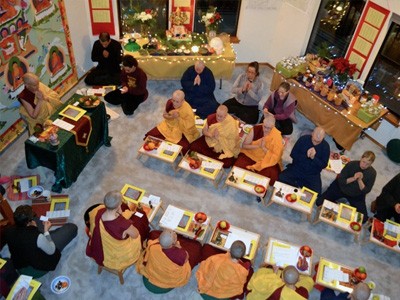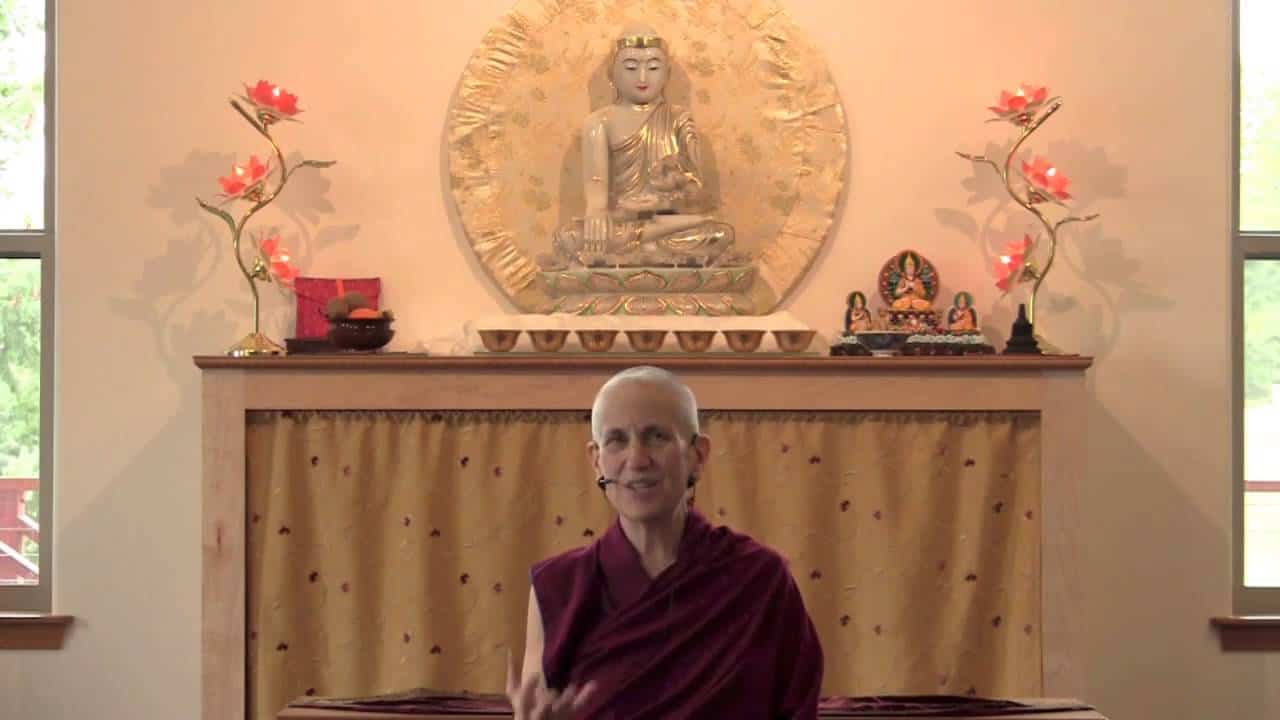Verse 80: Dwelling in sublime joy
Part of a series of talks on Gems of Wisdom, a poem by the Seventh Dalai Lama.
- By changing our own mind, the way people appear to us changes
- Adversity as the result of our own previous karma
- Repeatedly reflecting on our intention to benefit others
Gems of Wisdom: Verse 80 (download)
Who dwells in that sublime joy that is unaffected by any adversity?
He (or she) who makes life’s focus the benefiting of all the world.
“Who dwells in that sublime joy that is unaffected by any adversity?” Having sublime joy, without anybody trying to take revenge on you, or criticizing you, or without yourself criticizing yourself and making all kinds of trouble with other people. So that kind of person, free of that adversity, is someone who makes life’s focus the benefiting of all the world.
Somebody could say, “Well, the Dalai Lama makes life’s focus the benefit of all the world, but Beijing keeps calling him the splitter of the Motherland and the worst thing that ever happened to China, and blah blah blah. So how is he dwelling free of adversity?” Somebody could ask that.
From His Holiness’s side, in his mind, he doesn’t see that as an external enemy he has to overcome. In worldly terms it looks like adversity. But from his side, he looks at the people who are swearing at him and telling him he has to reincarnate so they can identify him and use him as a political pawn. He looks at them with compassion. And so his mind is peaceful because of this.
The point of this verse is that by changing our own mind we change our attitude so the way people appear to us changes. Also by changing our own mind our behavior changes. So how people treat us is going to change. But sometimes even you change your own mind other people still look at you as an enemy, or see you as an obnoxious blah blah, and then you have to realize, “Okay, that’s due to previous karma, and now I’m just experiencing the result of it. But I don’t need to get all upset and bent out of shape because of that.”
That’s very helpful. Especially when we’re criticized. Because we usually immediately get defensive. Like, “Oh, I didn’t do anything. And even if I did you’re not supposed to notice. Even if you notice you’re not supposed to say anything, you’re supposed to be tolerant and loving and accepting and making excuses for me.” Yes?
But just to accept that okay, when there’s adversity it’s the result of our own karma and that’s it. Nobody else to blame, nothing to get bent out of shape about. But instead to keep repeatedly in our own hearts reflect on this intention to be of benefit to the whole world. So even if we can’t directly benefit everybody, at least in our hearts we can. And so we stay connected by cultivating love and compassion and bodhicitta. And especially in situations where we would like to be able to help but we don’t have the ability, either from internal reasons or external conditions or whatever it is. Or some situations there’s really nothing very much that can be done. Then we stay connected by doing the taking and giving meditation, thinking that we take on their suffering and give them our happiness.
But the point is that by continually generating this heart of compassion it affects our own life in a very wonderful way, and it improves the quality of our own karma so that we don’t create so much negative karma, so we don’t have so many negative rebirths in the future. And it also of course puts us well on the path to being bodhisattvas and then buddhas.
As His Holiness always says, and you’ve heard me say this many times because I quote His Holiness a lot, that when we generate compassion and this wish to benefit the world, it’s us who is the prime beneficiary of this kind of attitude. Just as when we get angry we’re the one who gets the most harm from our own anger and our own arrogance and all this kind of stuff. So we’re the one who gets the most benefit from being compassionate. Because, His Holiness says, you don’t know how somebody else is going to react, you can’t make them happy just because you have compassion towards them. But having compassion in your own mind makes you happy. And hopefully, of course, it helps other people. But we can’t control other people, can we? It’s impossible. So we start with ourselves.
That’s why it’s very good first thing in the morning to cultivate that motivation not to harm, to be of benefit, to cultivate bodhicitta during the day. And then in the evening before we go to bed to check up how we did, do confession, make determination for the next day.
Our teachers tell us this a lot. And you may think, “Oh yeah, I’ve heard that, when are they going to say something new?” But the question is, do we practice it? That’s the question. We’ve heard it a zillion times. Do we practice it? No. Until we practice it they have to keep saying it.
So, might as well start now.
Venerable Thubten Chodron
Venerable Chodron emphasizes the practical application of Buddha’s teachings in our daily lives and is especially skilled at explaining them in ways easily understood and practiced by Westerners. She is well known for her warm, humorous, and lucid teachings. She was ordained as a Buddhist nun in 1977 by Kyabje Ling Rinpoche in Dharamsala, India, and in 1986 she received bhikshuni (full) ordination in Taiwan. Read her full bio.


